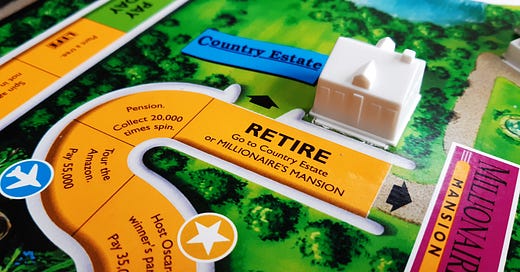“I want to retire, no longer required, I want to get by without the man on my back”
– Kaiser Chiefs, Retirement
When I first started working in a proper job (by which I mean full-time, in an office, on a permanent appointment), I hadn’t quite turned 25. I had in mind from the outset that I would work until 54, retire and then make sure I would live until at least 84, thereby spending longer in retirement than I did in employment.
This was an easy plan to make, because 54 was unimaginably old, I would without doubt be incredibly successful and wealthy by then, and three out of my four grandparents had made it past 84 so my chances seemed reasonable that I could do the same.
A lot has changed since those innocent, carefree days – I’ve not yet turned out to be quite as successful and wealthy as I might have imagined, and suddenly, 54 doesn’t seem all that old (or far away).
But also, the idea of retirement is a very different thing to what it seemed back at the end of the 20th century. Only a few years ago, middle aged people in the UK were being told that retirement was a thing of the past and that everyone should expect to continuously retrain into different lines of work in order to remain productive well into their dotage.
Although much of this messaging was from the Government of the time and was in the context of pensions (and pensioners) being unaffordable, I do feel a certain amount of affinity with the idea of continuous retraining – it makes life more interesting, it’s good for your mental health, and no-one wants to be that old guy who can’t understand anything any more (although I do feel like that on most days when I talk to anyone under 25)?
Retirement itself as a concept doesn’t really make sense today. It implies a binary change, from work to not work, from earning to not earning, from busy to idle. It harks back to a time when the only type of work was a set number of hours a week for a set wage. Now there are so many more opportunities and there are a hundred different ways to earn a living.
As more people have portfolio careers, start businesses, have side hustles, have stakes, equities and fingers in pies, the idea of stopping everything that could be defined as work just doesn’t make sense. Making progress through a career becomes about giving yourself more freedom over time (both financially and in terms of your lifestyle choices) and in that context, just stopping is counter-intuitive. What are you stopping for? What will you then do with your time and money? What’s the actual goal in all this?
The billionaire Andrew Wilkinson has talked about how many other billionaires have made their fortune only to find that they didn’t know what do to with themselves when they got there. The pursuit of money gave them purpose, and the money itself was far less important than just having a goal to aspire to.
Meanwhile, it’s never been easier to retrain in something completely new. So much training is available for free online and the bar for entry is very low. Training portals like Coursera and Udemy even curate learning pathways for you so you can see what skills you need to learn, and in what order. And of course you can do it all from the comfort of wherever you want.
So it’s hard for anyone to justifiably say that they can’t learn new things, or that they’re too old for a new start. It’s really just a matter of setting a realistic timescale for that. Whether your dream is to be retrain as a cyber analyst, to be an exhibited artist, to be a successful writer or a language teacher, you’ll want to think in terms of 3-5 years, not a few months or weeks.
For my generation, brought up on education finishing in your early twenties, it’s too easy to think ‘I wish I could have …’ rather than ‘over the next few years I’m going to …’
I’ve thought a lot about retirement in recent years and I’ve come to the conclusion that I would probably be perfectly happy to work well into old age, as long as it was interesting, worthwhile and kept the wolf from the door financially.
If you work in any kind of team or organisation, you will undoubtedly get a huge amount of social contact from your role. I am increasingly conscious of this as I get older and as I appreciate that while I often come home from work wanting to sit in a dark room for half an hour to decompress, I would miss that company, interaction and engagement hugely if it wasn’t there at all.
I would also miss the stress. If you are not constantly challenging yourself, your horizons shrink and I’m very conscious that if you’re going to remove a lot of that mental challenge, interesting mental problems, social interaction, angst and more, it needs to be replaced with something comparable, otherwise you just go stale and spend your days watching awful TV and worrying about inconsequential things.
So I’m receptive to the idea of working for many years yet. What I don’t want is to have to work, because I still have financial obligations that I need to meet. As has been said many times in other Substacks (but particularly that of Tim Denning) real wealth is about freedom, not cash. And if you aren’t working primarily for the money, you can really zero in on what you want to do, for its own sake. You can pursue your passion, whatever that may be.
Retirement is not about doing nothing, it’s about having the freedom to do what you want to do, much of which might still in fact be work. There’s a reason why so many scientists, academics and other specialists never retire – it’s because they remain fascinated by what they do and don’t want to stop doing it. As the adage goes, find something you love and you’ll never work a day in your life.
I can’t think of anything worse than just doing nothing – it would feel like waiting to die. I could retire tomorrow, and would immediately have no difficulty filling those 40-odd hours with worthwhile, enriching, productive and fun things. All those things (and more) that at the moment I try and squeeze into the time and energy I have left after the day job is done.
Similarly, I can’t understand why anyone could be bored when they retire – with an infinite number of possibilities and opportunities available; if you have the time and the money, you can achieve literally anything. And imagine going into a new job or venture boasting 60 or 65 years of relevant experience…
I think for many people therefore, what we think of when we think of retirement is simply the opposite of what we’ve had to do as part of our careers.
It’s the contrast, and the freedom to pursue that contrast, that is the key. If you have spent 40 years breaking rocks in the hot sun (or doing any kind of hard, manual or physical work), you will probably imagine retirement to be something where you can put your feet up and relax.
If you’ve spent decades sat in an office, you might imagine long days on your feet, hiking, exploring, travelling or otherwise just not being cooped up in a cubicle, meeting room or study. Looking at wide, sweeping vistas, not faces on computer screens. People in chilly, rainy countries like the UK tend to picture sunny beaches and poolside loungers.
It’s the contrast, not the absolute.
So retirement is no longer the hitting your 60th birthday (or 65th, or 70th) and living off the state in relative penury for the rest of your life. It’s certainly not sitting on a dusty sofa in front of the TV, nor on a plastic sun lounger in the Costa Del Sol.
Retirement is the point at which you realise that every choice, every decision in your life is yours to make – the things you buy, the ways you spend your time, who you spend that time with and where you do it. It’s making a conscious choice about how to spend your hours and doing exactly that. It’s not a destination, it’s a way of life.
So how do you know when you’ve got there, or even where ‘there’ is? Clearly, everyone’s version of that freedom will look different, and is likely to evolve over time. Working out where you want to be (or rather, how you want to be) requires some thought. Here are some questions you might ask yourself:
- What does my perfect normal week look like?
- What are the things that I really want to achieve in your life, over the next five years?
- What skills, experience or connections do I need to make that possible?
- How much money is enough for that?
You can then work backwards from there and it doesn’t need to be any more complex than those few questions.
My example would look something like this:
- I’d like to be spending more of my life doing creative work;
- I would love to be able to make some money from doing that;
- I’d like to be financially independent (not rich, but no debts, safety nets in place and enough to be geographically independent.
At the moment, I’m reasonably confident I can get to that point in about nine years. So the goal now becomes, how can I drastically shorten that? And what are the levers I have to do so?
So next will be the plan to make it happen – I’ll report back on that soon. In the meantime, what does your plan look like?







